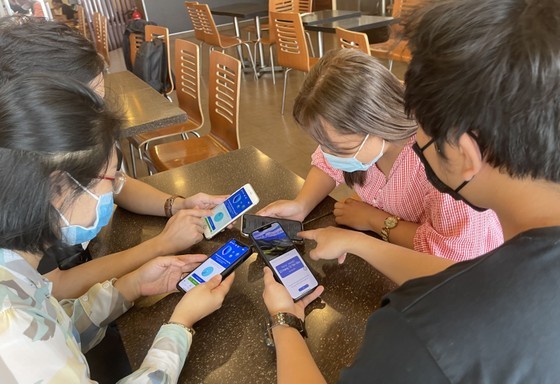 |
Only installing trusting apps is a good way for smart device owners to protect themselves from cyberattacks (Photo: SGGP) |
Recently, an Advanced Persistent Threat (APT) attack aiming at iOS mobile devices has been detected. Technological experts informed that infected devices can automatically send personal information (records, images, geolocation, sensitive data) of device owners to remote servers, which will then use these data for ill purposes.
Director Nguyen Van Cuong of the Cyber Security Department in Bkav Group mentioned typical attacks into smartphones. They can be via harmful apps installed on the device (followed by device taking-over to make scamming calls to others), vulnerabilities in software and the operation system, Bluetooth and wireless connections, file sharing.
Statistics presented by Kaspersky in July 2023 show that the total number of harmful emails blocked by its Anti-Phising system in 2022 was nearly 18 million, including 1.6 million aiming at businesses and 16.3 million at consumers in Vietnam, especially through mobile devices.
Technology Director Vu Ngoc Son of Vietnam National Cyber Security Technology Corp (NCS) commented that the most dangerous yet popular attack type is via a fake app, where criminals impersonate the staff of state agencies to send messages to or call victims and instruct these innocent people to install a harmful app that can control the infected device. Confidential information on these devices will then be stolen, and the devices can even be used to withdraw money from the victim’s bank accounts.
He advised the public to pay attention to their smartphones for any suspicious statuses like getting hot while not in use, quickly running out of battery, playing sound in inactive mode.
A personal smartphone when infected might cause great harm to related organizations or companies since this tool is used increasingly more in professional tasks.
Thanh Thuy, an officer of T.C. Co. in District 1 of HCMC, recalled her incident. While buying goods online, she saw a pop-up link offering discounts. After filling in the form and clicking the given link, nothing happened. When her phone became frozen, she immediately felt anxious and asked an IT officer in her company to check the device to find out that her phone had been attacked. Thanks to timely addressing, her working email saved on the phone had not been hacked.
Director Son warned that it is extremely risky to click strange links given in messages, emails, chat content and to install unfamiliar apps on Google Play Store and Apple App Store. It is also not advisable to allow apps to access messages and data on the phone unless to serve the functions of those apps. Setting up biometric authentication for banking apps is a wise choice.
Statistics from the World Economic Forum reveal that 95 percent of cyber security incidents are caused by humans. This is correlated to the data in Kaspersky’s 2022 Information Technology Security survey that 22 percent of information leak cases in small and medium enterprises are created by their own employees. This asks for a serious training session to raise awareness about cyber security and avoid popular security incidents.
Vice Chairman of Vietnam Information Security Association Ngo Vi Dong stated that this year is the high time for digital transformation, leading to both new strategies, technologies, and challenges. Right when the community still has a low guard on cyberattacks, hackers have taken advantage of advanced and novel technologies to conduct illegal activities in cyberspace for scamming purposes.
Obviously, besides the convenience and efficiency that state-of-the-art technologies offer to users, people should be cautious against dirty technological tricks to carry out cyberattacks or steal their sensitive information for ill intentions.
























